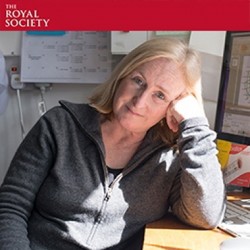By Helen Figueira
May 9, 2014
Time to read: 3 minutes
 Amanda Fisher, Director of the MRC Clinical Science Centre (CSC) and Group Leader Lymphocyte Development Group, is one of this year’s 50 scientists elected to the Fellowship of the Royal Society. She is recognised for her work underpinning the mechanisms involved in the AIDS virus, development of T lymphocytes in the immune system, embryonic stem cells and epigenetic gene regulation.
Amanda Fisher, Director of the MRC Clinical Science Centre (CSC) and Group Leader Lymphocyte Development Group, is one of this year’s 50 scientists elected to the Fellowship of the Royal Society. She is recognised for her work underpinning the mechanisms involved in the AIDS virus, development of T lymphocytes in the immune system, embryonic stem cells and epigenetic gene regulation.
Founded in 1660, the Royal Society was initiated as a scholarly society for science and is now the oldest scientific academy in continuous existence worldwide. Each year up to 52 Fellows are appointed on the basis of ‘substantial contribution to the improvement of natural knowledge, including mathematics, engineering science and medical science.’ Sir Isaac Newton, Charles Darwin, Albert Einstein and Stephen Hawking are among the eminent scientists included in the Fellowship.
Amanda Fisher joins previous members of the CSC including Professors James Scott, Rajesh Thakker, Elizabeth Simpson and Dame Kay Davies that are Fellows of the Royal Society, underscoring the Institute’s growing reputation for excellence in biomedical research. Since it was established in 1994, the CSC has undertaken pioneering studies in basic science and is currently focussed on Epigenetics, Genes and Metabolism and Integrative Biology. Embedded within the Hammersmith campus of Imperial College London the Institute provides the opportunity for discovery science to be translated towards improving our understanding of human disease, its diagnosis and treatment. The Medical Research Council (MRC) directly funds the Institute and provides freedom and resources for its investigators to pursue high quality research within the clinical sciences.
Amanda joined the CSC at its outset nearly twenty years ago and became Director in 2008. She started her research career in the 1980s, describing the first biologically active, molecular clone of HIV and the functions of several viral genes. Her later work on T lymphocytes – a major cellular component of the immune response – showed the importance of a gene’s location within the cell’s nucleus. More recently, her team have shown that in embryonic stem cells, a specific chromatin signature highlights genes that will although not expressed, will be important for subsequent embryo development.
On her election, Amanda Fisher said: “I am incredibly grateful to the Medical Research Council, who have supported me for twenty years to do the kind of work that I’ve wanted to do. They hired me as a PhD student fresh out of my degree and took a big risk. I think it’s rare that people are allowed to pursue their interests and the MRC have been hugely supportive. I think they deserve a great deal of thanks. I’m also really pleased to see the recognition for female scientists this year – two of Imperial’s new Fellows are women. I hope we’ll see women making up half of the new Fellows of the Royal Society before too long.”
YJ